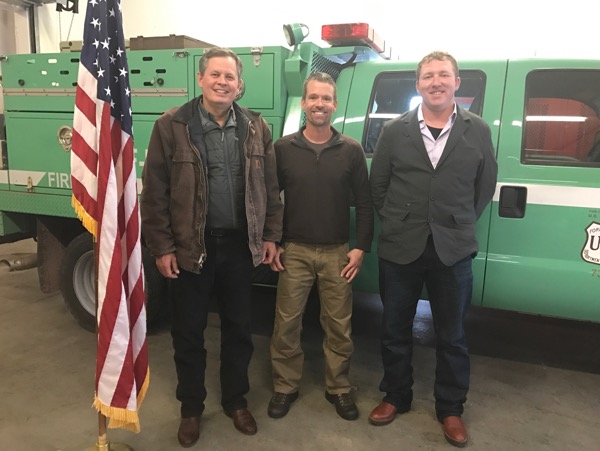HELENA, Mont. —U.S. Senator Steve Daines today announced legislation to protect wildland firefighters retirement.
Currently, if injured and not able to return to a firefighting position, federal wildland firefighters must switch from the 20-year retirement track authorized for federal employees with certain hazardous jobs to the 30-year retirement track for ordinary federal employees.
Daines’ fix will allow wildland firefighters to remain on the 20-year retirement track if they’re injured on the job. Additionally, Daines’ fix requires that overtime pay be considered as income for purposes of calculating worker’s compensation disability benefits since overtime pay constitutes a significant portion of wildland firefighter compensation.
“Protecting our communities and forests is a brave responsibility and injuries that our firefighters suffer shouldn’t affect their livelihoods,” Daines stated. “When firefighters go to work they should do so without fear of losing their benefits.”

Daines with Shane Ralston and Brendan Mullen in Helena today.
Shane Ralston, Forest Service Smokejumper, Stevensville: “As an injured firefighter with several unknowns in my future with the Forest Service, it would be a positive opportunity to be able to apply for non-fire jobs and still maintain the retirement I have worked toward my whole career. Personally I cannot see myself getting injured in the line of duty, and applying for a job with retirement benefits that cannot support everything I have risked myself for.”
Brendan Mullen, Forest Service Helitack Firefighter, Bozeman: “It would be a major improvement to consider overtime for injured employee work comp benefits. There is a major gap right now in the entry level jobs’ benefits pay scale. Currently a GS-3 could be severely injured at work and not be able to afford to live on his/her own while in the rehabilitation process. Their income would be limited enough to put them below a minimum wage annual income. These employees have enough burdens, money to live on should not add to their stresses.”
Vicki Minor, Executive Director, Wildland Firefighter Foundation: “Steve Daines been the most active Senator in the United States to help support Wildland Firefighters, and this is just one more example. We thank Senator Daines for understanding that a fireline injury is not only physically devastating for the firefighter, it can also be financially devastating. When firefighters regularly work 10 to 14-hour days for 14 days straight, the overtime pay is part of their family budget. When a severe injury ends a firefighter’s career, the Daines’ Fix will at least ensure firefighters have the financial support they need. The physical demands of this job means that these firefighters are usually young men and women with young families at home to support. Senator Daines understands that firefighters depend on their overtime to make ends meet. The Daines Fix will provide that extra measure of support when things go terribly wrong and a firefighter endures a severe injury.”
Casey Judd, President, Federal Wildland Fire Service Association: “Because firefighting is so physically demanding, federal firefighters make larger retirement contributions and are permitted to retire earlier. If a severely-injured wildland firefighter returns to work in a non-firefighting position because the injury prevents returning to firefighting work, that firefighter loses those extra contributions and fire retirement benefits. These brave men & women deserve the benefits they have earned as a result of their service to America. The Daines’ Fix would ensure injured federal wildland firefighters would retain their fire retirement provisions as if the firefighter had not been injured or disabled.”
The text of Daines’ bill is available HERE.
###
